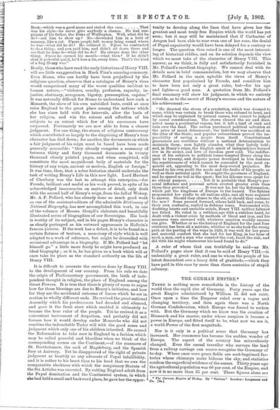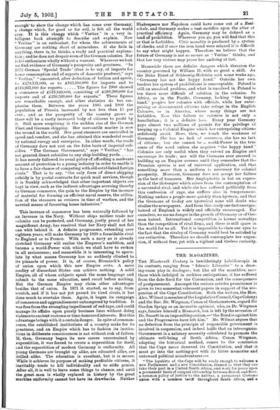THE GERMAN EMPIRE.*
THERE is nothing more remarkable in the history of the world than the rapid rise of Germany. Forty years ago the great Empire administered by William II. did not exist. Once upon a time the Emperor ruled over a vague and changing territory, and then again there was a North German Confederation, which Europe was forced to reckon with. But the Germany which we know was the creation of Bismarck and his master, under whose auspices it became a power in Europe, and fitted itself to be, what now we see it, a world-Power of the first magnitude.
Nor is it only in a political sense that Germany has increased. Her commerce has become the sudden wonder of Europe. The aspect of the country has miraculously changed. Even the casual traveller who surveys the land from a railway carriage can scarce recognise the Germany of to-day. Where once were green fields are soot-begrimed fac- tories whose chimneys make hideous the sky, and statistics confirm the superficial evidence of the senses. Thirty-years ago the agricultural population was 60 per cent, of the Empire, and now it is no more than 35 per cent. These figures alone are • The Garman .Thnpire of To-day. By " Veritas." London : Longman a and Co. [Si.] enough to show the change which ,has come over Germany; a change-which, for good or for evil, is felt all the world over It is this chaggs which " V eritas" in a very in book atteM to describe and explain. Now (- Writes " is an enthusiast, for whom the achievements of Germany are nothing short of miraculous. If she fails in anything, there is, he thinks, a ready and practical explana- tion; and he does not despair even of the German colonies. Nor is his enthusiasm wholly without a warrant. Wherever we look we find evidence of Germany's prosperity and greatness. "In 1872 German 'Special Trade' (that is to say, of imports for home consumption and of exports of domestio produce)," says " Veritas," "amounted, after deduction of bullion and specie, to .£279,13],000, or to £163,100,000 for imports and to £116,031,000 for exports. The figures for 1900 showed a commerce of £518,849,000, consisting of £288,280,000 for imports and of £230,569,000 for exports." These' figures are remarkable enough, and other statistics do but em- phasise them. Between the years 1895 and 1900 the population of Prussia increased by not less than 15 per cent., and as the prosperity of the country grows so there will be a vastly increased body of citizens to profit by it. Still more surprising is the sudden rise of the German Fleet end German shipping. Her mercantile marine is now the second in the world. Her great steamers are unrivalled in speed and comfort, and she has attained this wonderful result by national energy and enterprise. In other words, the trade of Germany does not rest on the false basis of imperial sub- sidies. "The. German Government," says " Veritas," "has not granted direct subsidies to any ship-building yards It has merely followed its usual policy of affording a moderate amount of protection to a young industry in order to enable it to have a fair chance of competing with old-established foreign rivals." That is to say, "the only form of direct shipping subsidy is by postal contracts for quick mail services, though it is frankly acknowledged that other important objects are kept in view, such as the indirect advantages accruing thereby to German commerce, the gain to the Empire by the increase of material for forming an efficient naval reserve, the ptilisa- tion of the steamers as cruisers in time of warfare, and the coveted means of favouring home industries."
This increase of commerce has been naturally followed by an -increase in the Navy. Without ships neither trade nor colonies can be protected, and Germany, justly proud of her magnificent Army, has resolved that her Navy shall not fall one whit behind it. A definite programme, extending over eighteen years, will make Germany by 1920 a formidable rival to England or to France. With such a navy as is already sketched Germany will realise the Emperor's ambition, and become a world-Power with which we shall have to reckon in all seriousness ; and meanwhile it is interesting to specu- late by what means Germany has so suddenly climbed to its pinnacle of power. It is, of course, Bismarck's policy of union upon which this new Empire rests. A mere medley of discordant States can achieve nothing. A solid Empire, all of whose subjects speak the same language and submit to the same education, need recoil before nothing. But the German Empire may claim other advantages besides that of union. In 1871 it started, so to say, from scratch, and if it has not yet passed its tired rivals, it has done much to overtake them. Again, it began its campaign of commerce and aggrandisement unhampered by tradition. It was free from the strangling impediment of red-tape, and could manage its affairs upon purely business lines without doing violence to ancient customs or time-honoured interests. But this advantage brings with it a certain danger. In spite of common- sense, the established institutions of a country make for its greatness, and an Empire which has to fashion its institu- tions in deliberate consciousness is not without risk of failure. If, then, Germany began its new career unrestrained by superstition, it was forced to create a superstition for itself, and the superstition of modern Germany is uniformity. All young Germans are brought up alike, are educated alike, are drilled-alike. The education is excellent, but it is severe. While it achieves its purpose of making profitable citizens, it ineyitably. tends to kill individuality and to stifle genius. After.allkit is well to leave some things to chance, and until the-great -man is wholly replaced in history by the great machine uniformity cannot but have its , drawbacks. Neither Shakespeare nor Napoleon could have come out of a Bad- schule, and Germany makes a vast sacrifice upon the altar of practical efficiency. Again, Germany may be defined as a lanitof prolaition Wherever you go, you will find that this or that is forbidden. Civic morality is produced by a system of checks, and if once the iron hand were relaxed it is difficult to say what might happen. Therefore we believe that the future of Germany is not so secure as " Veritas " thinks, and that her very virtues may prove her undoing at last.
Meanwhile there are definite dangers which threaten the country governed by William II. with so great a Skill. As the Duke Ernst of Schleswig-Holstein said some weeks age, "Germany has not the happy band." Outside her own borders her system of prohibitions is unacceptable. Poland is still an unsolved problem, and what is unsolved in Poland is ten times more difficult of solution in the colonies. In Africa, as in the Pacific, Germany, lacking "the happy hand," peoples her colonies with officials, while her enter- prising or discontented citizens take refuge in the English Colonies, or in . America, where many things are not forbidden. Now this failure to colonise is . not only a humiliation ; it is a definite loss. Every year Germany pays almost two millions of pounds for the privilege of keeping up a Colonial Empire which her enterprising citizens sedulously avoid. Here, then, we touch the weakness of Germany. She has no lack of resources, she has no lack of citizens; but she cannot be .. world-Power in the, true sense of the word unless she acquires "the happy hind." Colonies are only useful when they extend an Empire and encourage its trade; nor will the Germans ever succeed in building up an Empire oversee until they remember that the Prussian system is not of universal application, and that something more than a uniform is necessary for colonial prosperity. Moreover, Germany does not accept her failure in the best of humours. Her Anglophobia, is but an expres- sion of the ill-temper which arises from the contemplation of a successful rival, and while she has suffered politically from this confession of rage, she suffers also in temperament. Nothing undoes a people more quickly than hysteria, and that the Germans of to-day are hysterical none will doubt who studies the newspapers. And from this study one fact emerges: hatred of England is widely and officially encouraged. For ourselves, we see no danger in the growth of Germany or of Ger- man hatred. International competition is keener nowadays than the competition of rival firms, and there is still space in the world for us all. Yet it is impossible to close our eyes to the fact that the rivalry of Germany would best be satisfied by our extinction. Therefore we should contemplate her expan- sion, if without fear, yet with a vigilant and tireless curiosity.















































 Previous page
Previous page